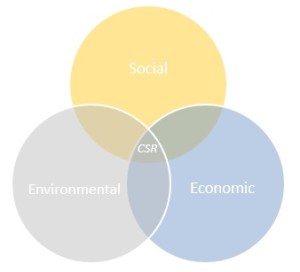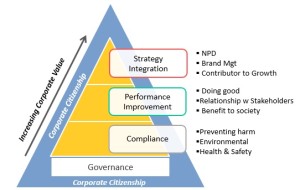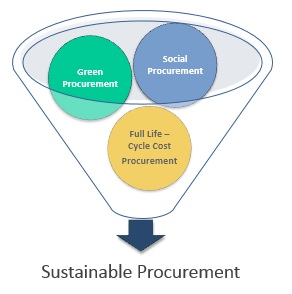Part 1 – Reputation
Procurement Capabilities in CSR: Reputation
Procurement Capabilities in CSR: Reputation – A three part guide for CEO’s, CFO’s and CPO’s to assess how procurement can make CSR a competitive weapon in their organisations success
Here in Part 1 we discuss procurement’s role in CSR to protect the corporate brand and reputation.
The events that have recently hit Toyota and more recently BP and Johnson & Johnson show that no company is immune to reputation damage. Hard-won reputations can be seriously damaged once events bring even the mightiest corporations under media scrutiny.
Once in trouble, it is too late. Once under the media spotlight, bad practice in the supply chain, unethical sourcing or corruption and bribery are bound to surface.
What is Sustainable procurement?
Sustainable procurement integrates economic, social and environmental considerations (commonly referred to as
the triple bottom line – See figure 1) into a company’s overall procurement strategy, by seeking opportunities to reduce the negative environmental and social impacts of procurement decisions.
CSR is becoming increasingly strategic to the welfare of modern companies; and procurement, as the interface with the company’s value chain, can play a key role in developing social, economic and environmental practices.
What leading organisations are already doing:
Companies fall into two categories:
- Laggards who are merely concerned with defending reputational risk, reacting to crises as they arise.
- Leaders who view reputation, as a source of competitive advantage to be managed and nurtured and that can add worth to a company.
Leaders have a high level of CSR maturity (see figure 2) and :
- Realise that single companies – however large – cannot deal with sustainability alone
- Make CSR a Board level issue
- Work with their suppliers throughout the supply chain
- Adopt Codes of Conduct
- Audit their supply chains for compliance
These companies place CSR at the heart of their business, building trust with stakeholders and promoting high standards and ethical policies. The CPO must align themselves and the supply chain to such policies.
As the function managing the external supply chain and integrating it with internal systems and processes, procurement is best placed to create alignment between them. CPO’s therefore play a vital role as ’guardian of the brand’ and helping to safeguard corporate reputation.
CSR issues arise at all stages of the procurement process:
- Identifying the need
- Developing the specification
- Supplier qualification and appraisal
- Supplier Selection
- Contract and supplier management
- – Renewal
That CPO’s need to take sustainable procurement very seriously, is clear. The application of stakeholder lead approach to CSR backed up with reputational risk management practices are critical components of the sustainable procurement process.
Nuff said …
In part 2 we discuss a stakeholder based approach to sustainable procurement
Related content:




